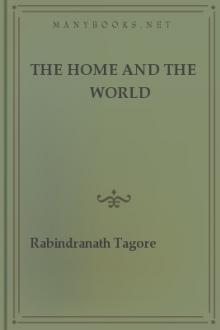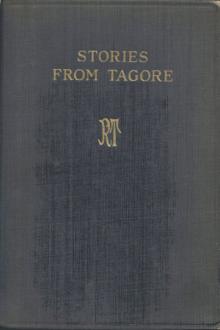The Home and the World - Rabindranath Tagore (books to read in your 30s .txt) 📗

- Author: Rabindranath Tagore
- Performer: -
Book online «The Home and the World - Rabindranath Tagore (books to read in your 30s .txt) 📗». Author Rabindranath Tagore
truth. This was understood in our country in the old days, and
so they had the courage to declare that for those of little
understanding untruth is the truth. For them, who can truly
believe their country to be a goddess, her image will do duty for
the truth. With our nature and our traditions we are unable to
realize our country as she is, but we can easily bring ourselves
to believe in her image. Those who want to do real work must not
ignore this fact.
Nikhil only got excited. "Because you have lost the power of
walking in the path of truth's attainment," he cried, "you keep
waiting for some miraculous boon to drop from the skies! That is
why when your service to the country has fallen centuries into
arrears all you can think of is, to make of it an image and
stretch out your hands in expectation of gratuitous favours."
"We want to perform the impossible," I said. "So our country
needs must be made into a god."
"You mean you have no heart for possible tasks," replied Nikhil.
"Whatever is already there is to be left undisturbed; yet there
must be a supernatural result:"
"Look here, Nikhil," I said at length, thoroughly exasperated.
"The things you have been saying are good enough as moral
lessons. These ideas have served their purpose, as milk for
babes, at one stage of man's evolution, but will no longer do,
now that man has cut his teeth.
"Do we not see before our very eyes how things, of which we never
even dreamt of sowing the seed, are sprouting up on every side?
By what power? That of the deity in our country who is becoming
manifest. It is for the genius of the age to give that deity its
image. Genius does not argue, it creates. I only give form to
what the country imagines.
"I will spread it abroad that the goddess has vouchsafed me a
dream. I will tell the Brahmins that they have been appointed
her priests, and that their downfall has been due to their
dereliction of duty in not seeing to the proper performance of
her worship. Do you say I shall be uttering lies? No, say I, it
is the truth--nay more, the truth which the country has so long
been waiting to learn from my lips. If only I could get the
opportunity to deliver my message, you would see the stupendous
result."
"What I am afraid of," said Nikhil, "is, that my lifetime is
limited and the result you speak of is not the final result. It
will have after-effects which may not be immediately apparent."
"I only seek the result," said I, "which belongs to today."
"The result I seek," answered Nikhil, "belongs to all time."
Nikhil may have had his share of Bengal's greatest gift--
imagination, but he has allowed it to be overshadowed and nearly
killed by an exotic conscientiousness. Just look at the worship
of Durga which Bengal has carried to such heights. That is one
of her greatest achievements. I can swear that Durga is a
political goddess and was conceived as the image of the
Shakti of patriotism in the days when Bengal was praying
to be delivered from Mussulman domination. What other province
of India has succeeded in giving such wonderful visual expression
to the ideal of its quest?
Nothing betrayed Nikhil's loss of the divine gift of imagination
more conclusively than his reply to me. "During the Mussulman
domination," he said, "the Maratha and the Sikh asked for fruit
from the arms which they themselves took up. The Bengali
contented himself with placing weapons in the hands of his
goddess and muttering incantations to her; and as his country did
not really happen to be a goddess the only fruit he got was the
lopped-off heads of the goats and buffaloes of the sacrifice.
The day that we seek the good of the country along the path of
righteousness, He who is greater than our country will grant us
true fruition."
The unfortunate part of it is that Nikhil's words sound so fine
when put down on paper. My words, however, are not meant to be
scribbled on paper, but to be scored into the heart of the
country. The Pandit records his Treatise on Agriculture in
printer's ink; but the cultivator at the point of his plough
impresses his endeavour deep in the soil.
X
When I next saw Bimala I pitched my key high without further ado.
"Have we been able," I began, "to believe with all our heart in
the god for whose worship we have been born all these millions of
years, until he actually made himself visible to us?
"How often have I told you," I continued, "that had I not seen
you I never would have known all my country as One. I know not
yet whether you rightly understand me. The gods are invisible
only in their heaven--on earth they show themselves to mortal
men."
Bimala looked at me in a strange kind of way as she gravely
replied: "Indeed I understand you, Sandip." This was the first
time she called me plain Sandip.
"Krishna," I continued, "whom Arjuna ordinarily knew only as the
driver of his chariot, had also His universal aspect, of which,
too, Arjuna had a vision one day, and that day he saw the Truth.
I have seen your Universal Aspect in my country. The Ganges and
the Brahmaputra are the chains of gold that wind round and round
your neck; in the woodland fringes on the distant banks of the
dark waters of the river, I have seen your collyrium-darkened
eyelashes; the changeful sheen of your sari moves for me
in the play of light and shade amongst the swaying shoots of
green corn; and the blazing summer heat, which makes the whole
sky lie gasping like a red-tongued lion in the desert, is nothing
but your cruel radiance.
"Since the goddess has vouchsafed her presence to her votary in
such wonderful guise, it is for me to proclaim her worship
throughout our land, and then shall the country gain new life.
'Your image make we in temple after temple.' [20] But this our
people have not yet fully realized. So I would call on them in
your name and offer for their worship an image from which none
shall be able to withhold belief. Oh give me this boon, this
power."
Bimala's eyelids drooped and she became rigid in her seat like a
figure of stone. Had I continued she would have gone off into a
trance. When I ceased speaking she opened wide her eyes, and
murmured with fixed gaze, as though still dazed: "O Traveller in
the path of Destruction! Who is there that can stay your
progress? Do I not see that none shall stand in the way of your
desires? Kings shall lay their crowns at your feet; the wealthy
shall hasten to throw open their treasure for your acceptance;
those who have nothing else shall beg to be allowed to offer
their lives. O my king, my god! What you have seen in me I know
not, but I have seen the immensity of your grandeur in my heart.
Who am I, what am I, in its presence? Ah, the awful power of
Devastation! Never shall I truly live till it kills me utterly!
I can bear it no longer, my heart is breaking!"
Bimala slid down from her seat and fell at my feet, which she
clasped, and then she sobbed and sobbed and sobbed.
This is hypnotism indeed--the charm which can subdue the world!
No materials, no weapons--but just the delusion of irresistible
suggestion. Who says "Truth shall Triumph"? [21] Delusion
shall win in the end. The Bengali understood this when he
conceived the image of the ten-handed goddess astride her lion,
and spread her worship in the land. Bengal must now create a new
image to enchant and conquer the world. Bande Mataram!
I gently lifted Bimala back into her chair, and lest reaction
should set in, I began again without losing time: "Queen! The
Divine Mother has laid on me the duty of establishing her worship
in the land. But, alas, I am poor!"
Bimala was still flushed, her eyes clouded, her accents thick, as
she replied: "You poor? Is not all that each one has yours?
What are my caskets full of jewellery for? Drag away from me all
my gold and gems for your worship. I have no use for them!"
Once before Bimala had offered up her ornaments. I am not
usually in the habit of drawing lines, but I felt I had to draw
the line there. [22] I know why I feel this hesitation. It is
for man to give ornaments to woman; to take them from her wounds
his manliness.
But I must forget myself. Am I taking them? They are for the
Divine Mother, to be poured in worship at her feet. Oh, but it
must be a grand ceremony of worship such as the country has never
beheld before. It must be a landmark in our history. It shall
be my supreme legacy to the Nation. Ignorant men worship gods.
I, Sandip, shall create them.
But all this is a far cry. What about the urgent immediate? At
least three thousand is indispensably necessary--five thousand
would do roundly and nicely. But how on earth am I to mention
money after the high flight we have just taken? And yet time is
precious!
I crushed all hesitation under foot as I jumped up and made my
plunge: "Queen! Our purse is empty, our work about to stop!"
Bimala winced. I could see she was thinking of that impossible
fifty thousand rupees. What a load she must have been carrying
within her bosom, struggling under it, perhaps, through sleepless
nights! What else had she with which to express her loving
worship? Debarred from offering her heart at my feet, she
hankers to make this sum of money, so hopelessly large for her,
the bearer of her imprisoned feelings. The thought of what she
must have gone through gives me a twinge of pain; for she is now
wholly mine. The wrench of plucking up the plant by the roots is
over. It is now only careful tending and nurture that is needed.
"Queen!" said I, "that fifty thousand rupees is not particularly
wanted just now. I calculate that, for the present, five
thousand or even three will serve."
The relief made her heart rebound. "I shall fetch you five
thousand," she said in tones which seemed like an outburst of
song--the song which Radhika of the Vaishnava lyrics sang:
/*
For my lover will I bind in my hair
The flower which has no equal in the three worlds!
*/
--it is the same tune, the same song: five thousand will I bring!
That flower will I bind in my hair!
The narrow restraint of the flute brings out this quality of
song. I must not allow the pressure of too much greed to flatten
out the reed, for then, as I fear, music will give place to the
questions "Why?" "What is the use of so much?" "How am I to get
it?"--not a word of which will rhyme with what Radhika sang! So,
as I was saying, illusion alone is real--it is the flute itself;
while truth is





Comments (0)